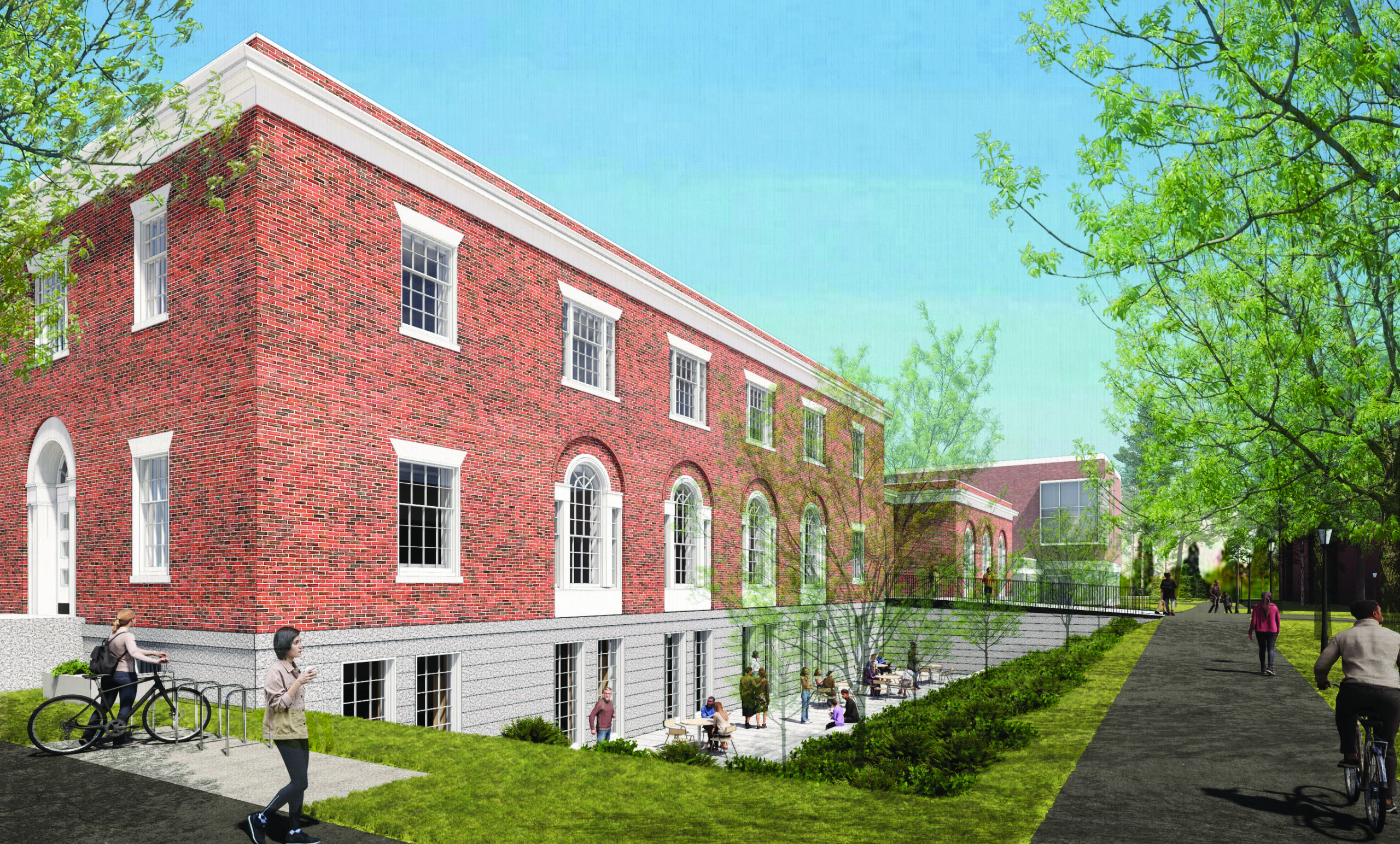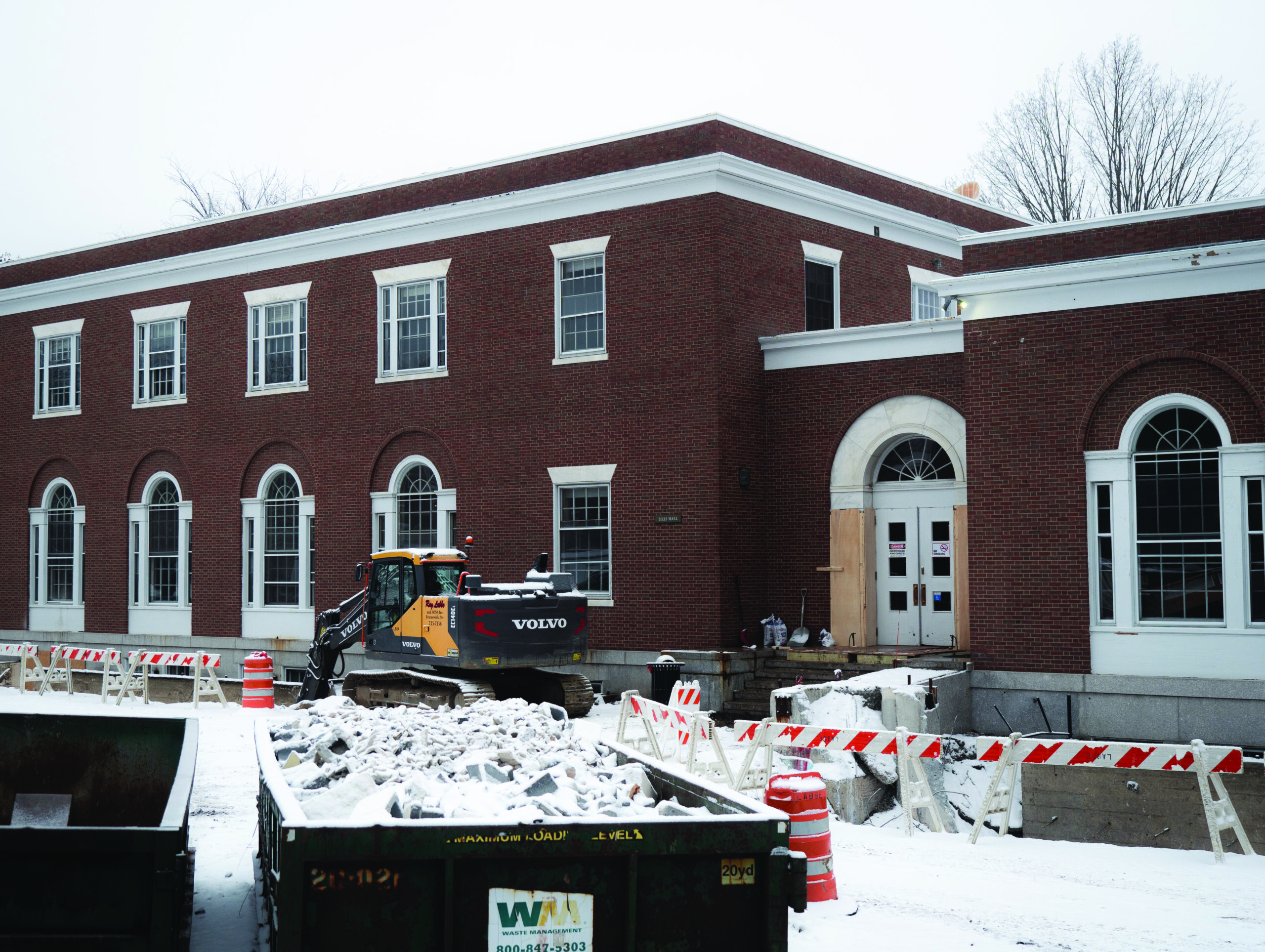Construction begins on major renovation of Sills Hall
January 26, 2024
 Courtesy of HGA Architects
Courtesy of HGA ArchitectsA large fenced-off construction area and the sound of beeping excavators on the site of Sills Hall and Cleaveland Quad greeted students returning for the spring semester. Crews began work over winter break on the first major renovation of Sills Hall since the building opened in 1950, after being the first academic building built on campus after both world wars.
Work on the project is expected to finish in time for classes in the fall of 2025. Capital Projects Manager Sharon Ames wrote in an email to the Orient that Cleaveland Quad will reopen in time for commencement for the Class of 2025 and that faculty will move into their new offices after the spring semester of that year.
Prior to the renovation, Sills Hall was home to the departments of classics, German, Russian and Romance languages and literatures. Ames said in an interview with the Orient that Sills will still house these departments when work is complete.
The refurbished building will be home to 22 faculty offices and nine classrooms consisting of 50-person, 35-person and seminar room configurations. In addition, Ames said that the renovation will add student common spaces around classrooms and faculty offices, features that the building currently lacks.
One notable addition to the building will be an outdoor terrace at the basement level adjoining the Cleaveland Quad that will be accessed from the inside of the building. Ames said that crews will excavate areas around Sills to enable the construction of the terrace in addition to floor-to-ceiling windows that will bring more natural light into the basement.
Sills will also be made ADA accessible with the renovation: An elevator will be added at the building’s west end, and a ramp will replace the stairs at the main entrance facing the Cleaveland Quad.
In place of Smith Auditorium, Ames wrote, will stand new offices and an open student space called the Athenaeum. Film screenings for the cinema studies department, formerly held in the auditorium, are now located in the Mills Hall screening room.
Sills’ construction has resulted in additional disruptions to the departments based within the area. Due to the increase of noise caused by the construction, two neuroscience labs—one research and one teaching—located in the basement of Kanbar Hall have been forced to temporarily relocate to Druckenmiller Hall.
Zack Reynolds ’24, a neuroscience major working on an honors project in Kanbar, said that the construction has significantly affected his and his peers’ research on animal behavior in Assistant Professor of Psychology and Neuroscience Jennifer Honeycutt’s lab.
“[The construction noises] disrupt our behavioral analyses,” Reynolds said. “Forcing [neuroscience lab students] to move out of Kanbar’s basement and to Druckenmiller also causes problems because the space we have in Kanbar is made specifically for what we do and Druckenmiller is not.”
Despite the inconveniences the construction may cause, Professor of Cinema Studies Tricia Welsch, who occupied an office in Sills for 30 years prior to the beginning of the renovation, noted that the project was clearly justified.
“We had a catastrophic roof leak two summers ago,” she said. “It’s overdue.”
 Alex Spear
Alex SpearPlans to renovate the building were first outlined in the 2017 campus development plan and were further refined in an Academic and Administrative Space plan completed in 2021.
Ames said that the renovation will prioritize preserving Sills Hall’s historic facade and interior features while revitalizing and enhancing academic and common spaces.
The original woodwork of the Peucinian Room located in the basement and departmental prize panels in various classrooms in Sills will be preserved, Ames said, and are currently being preserved off-site for the duration of construction.
In addition to the student spaces and terrace, Ames said that the project will add insulation and will implement a heating system that will help enable the College to eventually remove the central steam plant, decreasing the building’s climate footprint.
“The College’s sustainability goals are a core guiding principle to the Sills Hall renovations,” Ames wrote.
Welsch said that the interdisciplinary and close-knit faculty community and lively activity in Sills were instrumental to the success of the Cinema Studies program since her arrival at the college.
“What I liked about Sills was its incredible collegiality,” Welsch said. “People that worked there represented a lot of different departments and that created understanding across different programs.”
She joked that years ago, the building’s faculty camaraderie was so renowned that professors there were known as the “Sills Mafia.”
Although she thinks the project is warranted, Welsch expressed her worries that the building’s community will not be the same after the renovation. She is not among the faculty who will return to the building after construction is completed.
“I don’t know how easy it will be to recapture the strongly collegial feeling that we had there,” she said.
Ames said that the renovation process included close collaboration with faculty and added that they were present at all of the design meetings for the building.
According to Ames, Facilities Management prioritized maintaining the existing features of Sills as both a sustainability measure and a matter of historic design.
“The amazing architecture that we have and the history of the architecture, if we were to tear that down, you lose so much of what Bowdoin has to offer in its character,” Ames said.
Ames emphasized that Sills’ history heightens the importance of preserving its original character.
“It’s a really important campus edge building,” Ames said.

Comments
Before submitting a comment, please review our comment policy. Some key points from the policy: